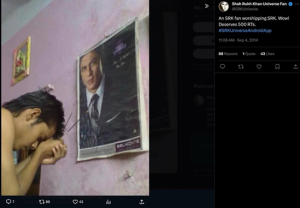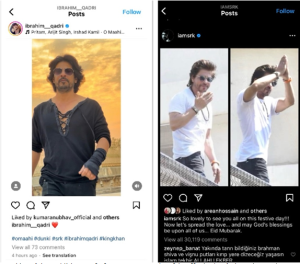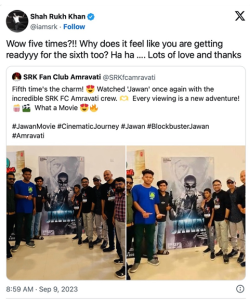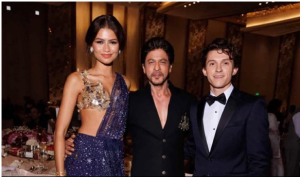59 Looking at Shah Rukh Khan’s Fan Base in the Celebrity Fandom Domain
Introduction
What is it about a 58-year-old South Asian actor that captivates people of all ages to the point of obsessive devotion across cultural and geographic divides? In the context of celebrity fandom, fandom is a complex and dynamic phenomenon defined by fervent, frequently compulsive, devotion to a specific person or work of culture. The multiplicity of fandom’s expressions and the wide range of intellectual and socioemotional activities fans partake in make it difficult to define.(Lozano Delmar et al., 2020). Fandom is more than just admiration; it includes things like actively consuming media products, creating content, and engaging in fan communities. The term “fan” has become more widely used to refer to a wide variety of interactions with celebrities or media content. More people are identifying as fans in a variety of ways, which challenges the traditional associations with excess or obsession. Within the celebrity world, fandom can take on diverse forms, ranging from enthusiastic endorsement to strong disapproval, sparking conversations about negative fans and unhealthy fandom. Understanding fandom in the digital age is made more difficult by the emergence of new offline and online spaces. As a result, the idea of fandom is not limited to a single definition; rather, it encompasses the complex and dynamic dynamics of fan identity and engagement in the context of celebrity culture.
In 2023, the phenomenon of celebrity fandom has not only persisted but also attained previously unheard-of heights in the dynamic field of popular culture. A fascinating lens through which to view the complex dynamics of contemporary praise is the study of Bollywood’s Shah Rukh Khan’s (SRK) fandom, as the digital age continues to redefine the nature of fan engagement. This essay explores the many facets of celebrity fandom, looking at the significant influence of technology such as social media platforms like Instagram, Twitter, and YouTube on fan behaviour. This study explores the actions of Shah Rukh Khan’s devoted followers, shedding light on important ideas in the field of celebrity adoration. Through an examination of fan behaviours like parasocial interactions, affective publics, and the gathering of followers worldwide, the research aims to unravel the complex dynamics that define the modern celebrity worship environment. This study attempts to provide nuanced insights into the changing nature of celebrity admiration through the prism of Shah Rukh Khan’s fandom, illuminating the connections between conventional fan behaviours and the contemporary, interconnected world.
Summary of the King of Bollywood
Regarded as the “King of Bollywood” and the “Badshah of Bollywood,” Shah Rukh Khan is among the most well-known and significant movie stars in the world. In addition to his success in the movies, he is the second-richest entertainer in the world, which speaks to his versatility as an actor, producer, TV host, co-owner of a cricket team, and philanthropist. With this recognition, he stands at the crossroads of the post-liberalization India that is becoming a hyper consumerist, capitalist nation. Early in the 1990s, as India moved from a planned socialist economy to neoliberal capitalism and the Internet era began, SRK became a global celebrity.He is positioned as the pinnacle of India’s acclaimed integration into the global capitalist system due to his cosmopolitan masculinity and strong belief in meritocratic capitalism.
Revealing The worship of Shah Rukh Khan’s Fans
“Stever (2009) defined celebrity worshipers as a group of individuals with compulsive and obsessional attachment with their idols. Celebrity worshipers are the people who exhibit an extremely profound adoration and devotion for a celebrity (Raviv, Bar-Tal, Raviv, & Ben-Horin, 1996).” (Singh & Banerjee, 2018).
Fans of Shah Rukh Khan engage in a kind of worship that goes beyond traditional admiration and the silver screen. The admiration for the Bollywood star is so intense that it approaches religious adoration, which distinguishes it from other forms of celebrity fandom. These admirers develop a strong emotional bond with him that reflects the dynamics of the affective public by delving into his personal life in addition to applauding his on-screen persona. Shah Rukh Khan becomes more than just a celebrity because of his fans’ shared emotional investment; he becomes a symbol around whom they gather, exchanging and magnifying their affective reactions.

A Fanpage of Shah Rukh Khan’s applauding a man literally worshipping him.
According to Zizi Papacharissi, affective publics are the dynamic, ever-changing, and highly emotional aspects of modern publics in the context of digital and networked media. This term highlights the relational and performative aspects of affect, or emotions and feelings, and highlights their centrality in forming the composition of these publics. Affective publics recognize the intricate relationship between digital technologies and human behaviour, in contrast to conventional ideas of the public as a single, deliberative entity. The phrase acknowledges affect as a crucial component of discourse, not as an enemy, and as a factor in the shifting dynamics between offline and online publics.(Lünenborg, 2019). The idea of affective publics within celebrity fandom is illustrated by the example of a fan literally worshipping Shah Rukh Khan and the existence of a fan page devoted to praising such activities. The act of worship and the establishment of a fan page are examples of the affective bonds that unite people in a common emotional domain. As a hub for the digital community, the online platform enhances the affective dynamics by giving fans a platform to celebrate and express their strong emotional bond with the Bollywood star. The construction of an affective public around Shah Rukh Khan is facilitated by this collective celebration and reinforcement of worship behaviours. In this community, emotions, shared experiences, and performative acts become essential elements of fan culture that surpass individual boundaries.
Another example of Shah Rukh Khan’s fans demonstrating affective public is them pretending to be him on social media platforms like Instagram. (Desk, 2023). One specific impersonator who gained fame of Instagram is Ibrahim. He currently has 1.1 million followers. He uploads videos and images to Instagram, but he also creates vlogs on his YouTube channel where he plays ShahRukh Khan at events he gets hired for.

Collage of two Instagram posts of Shah Rukh Khan (right) and one of his impersonators (left)
The example of Ibrahim Qadri demonstrates the benefits of fandom for individuals as well as its transformational power. The impersonator capitalizes on the devoted fan base and the emotional bond that exists between him and Shah Rukh Khan by taking on the persona of a well-liked celebrity.
As a result of this interaction, the fan base recognizes and elevates the individual to the status of micro-celebrity. Micro-celebrities are people who, like traditional celebrities but on a smaller, more approachable scale, actively cultivate a distinctive public image, frequently for personal branding purposes. This idea is using different channels to get exposure and recognition, like social media.(Khamis et al., 2016)
In addition to profiting from the emotional connection that fans have with the real Shah Rukh Khan, the impersonator gains popularity and influence from the fan culture, albeit on a lesser scale. An individual can actively contribute to the greater fan narrative and build a sense of community within the fan base by engaging in impersonation as a form of participatory fandom.
Examining the Close Ties That Shah Rukh Khan’s Fans Have in the Realm of Parasocial Relationships
The one-sided, simulated relationship that people develop through mediated experiences like television, social media, or other platforms with media personalities, such as celebrities, is known as parasociality.(Chung & Cho, 2017). The parasocial bonds between celebrities like Kim Kardashian and their fans have grown stronger because of social media interactions. This phenomenon also applies to Shah Rukh Khan, who interacts with his fans on Twitter and other platforms by sharing personal insights. Shah Rukh Khan stands to gain from his increased popularity and visibility as a result of his active participation in social media. In return, his followers feel a feeling of intimacy, as though they are friends with him on a more personal level. For example, Shah Rukh Khan’s audience engaging in parasocial behaviour is demonstrated by a Twitter exchange between him and a fan.(Chowdhury, 2023).

Shah Rukh Khan retweeting and responding to his fans watching his new film 5 times.
The dynamics of parasociality are demonstrated by this interaction. Fans frequently share their experiences and interactions with celebrities on social media, especially Twitter. A virtual connection is formed when Shah Rukh Khan responds to a fan who has expressed interest in watching his latest film more than once. For the fan, this seemingly one-sided exchange creates a sense of intimacy and personal connection. By engaging in this way, Khan helps fans feel a simulated closeness to the celebrity, which is known as a parasocial relationship. Shah Rukh Khan demonstrates how parasociality flourishes in the digital age by replying to specific fans, strengthening the appearance of a personal connection while also acknowledging their devotion and turning fan-celebrity interactions into more intimate and reciprocal experiences.
To celebrate Shah Rukh Khan’s birthday in November, a crowd of his devoted followers gathered outside his home. The enduring bond between celebrities and their fans is reflected in this act of fandom. Inspired by a common admiration for Khan, the supporters showed their dedication by gathering outside his home, fostering a festive atmosphere among them. Even though the actor and his fans are physically separated, this get-together represents the ability of celebrity fandom to transcend the internet and materialize in live events.(Hungama, 2023). However, standing in front of a celebrity’s home and interacting with them is a type of proximity-seeking and physical intrusion that goes beyond the normal bounds of fan-celebrity interactions. By physically placing themselves in the celebrity’s personal space, fans try to close the perceived distance between them and the celebrity. This can be seen as an extreme form of parasocial behaviour. These behaviours, which are frequently classified as trespassing or stalking, can be intrusive and violate the privacy and security of the celebrity. It is indicative of a strong, if one-sided, desire for a personal connection and may be motivated by a fan’s emotional attachment to the public persona of the celebrity.
The darker side of celebrity fandom and the possible risks of extreme parasociality were brought to light by an incident involving two of Shah Rukh Khan’s fans breaking into the actor’s home in March. (Etimes, 2023). The invasion demonstrates that the boundaries between famous people and their fans get blurred, especially with celebrities responding to their fans and fueling their one-sided relationship. While fandom frequently encourages a sense of community and shared enthusiasm, incidents such as these highlight how crucial it is to respect public figures’ privacy and personal space.
Hollywood Stars Being a Part of SRK’s Fandom
Beyond national boundaries, Shah Rukh Khan has won praise from Hollywood heavyweights and demonstrated the lasting influence of his fame in international film. Prominent actors such as Hugh Jackman, Daniel Radcliffe, and Leonardo DiCaprio have publicly acknowledged their intense admiration for the Bollywood legend. Jackman has acknowledged that he takes cues from the dance and charisma of Shah Rukh Khan, believing the actor to be a suitable Wolverine. Famous Harry Potter actor Daniel Radcliffe praises Khan as the pinnacle of elegance and sophistication, saying he would love to work with him on a Bollywood project. (Lehran, 2023).

Shah Rukh Khan (middle) with Zendaya (left), and Tom Holland (right).
The occurrence of major Hollywood stars expressing their love and admiration for Shah Rukh Khan highlights the influence of his fame on a global scale. Such incidents demonstrate the global interconnectedness of celebrity fandom while also showcasing Shah Rukh Khan’s appeal across cultural boundaries. Shah Rukh Khan is seen to be a captivating and powerful figure in the world of cinema because Hollywood stars, who themselves hold prominent positions in the global entertainment industry, openly express their admiration for him. Shah Rukh Khan’s admiring cast of Hollywood celebrities is a testament to the active role his diverse and devoted fan base plays, rather than a one-sided acknowledgement.
Conclusion
In summary, the study of celebrity fandom as seen through the eyes of Shah Rukh Khan’s supporters highlights the complex dynamics that characterize modern adoration in the digital era. Because of the proliferation of online spaces and the transformative power of technology, the phenomenon of celebrity worship has not only persisted but has reached previously unheard-of heights. The variety of fan expressions from passionate support to threatening SRK’s security challenges preconceived assumptions and promotes a more welcoming interpretation of fandom. This essay has shed light on important ideas related to celebrity worship by analyzing the behaviour of SRK’s fans. It has also provided insights into affective publics, parasocial interactions, and the worldwide convergence of followers.
The changing nature of fan interaction, made possible by social media sites like Instagram, Twitter, and YouTube, is one of the main observations. Because of these digital platforms, fandom has become more accessible and inclusive. Fans can now actively create content, participate in lively online communities, and consume media products. Beyond its conventional connotations, the term “fan” itself now refers to a broad range of interactions with celebrities or media content. This change dispels ideas about excess or obsession and opens the door to a more complex understanding of the various ways people define themselves as fans.
An examination of Shah Rukh Khan’s fan base can be seen as a microcosm that captures the complexity of modern fan identity and involvement. Examining parasocial interactions reveals the complex dance that blurs the boundaries between what is perceived as real and what is real between a celebrity and their fan. Online and off, affective publics draw attention to the emotional commitments that fans make to the common experience of adoration, fostering a vibrant and interwoven fan community. The global gathering of fans is an example of how fandom transcends national and cultural boundaries.
As technology persists in transforming the terrain of celebrity culture, the analysis of celebrity fandom grows more pertinent and dynamic. The fan base of Shah Rukh Khan presents an intriguing case study, illustrating how fan behaviours change because of shifting media. This investigation pushes us to revaluate the conventional definitions of fandom by providing insightful information about the mutual relationship between celebrities and their fans.
All things considered, the phenomenon of celebrity fandom is a complex tapestry interwoven with the threads of diverse fan expressions, global fan connections, and technological advancements. The complex dance between celebrity and fan is best shown by Shah Rukh Khan’s multifaceted fandom, which illuminates the various ways in which fans interact with and honour their heroes. This study adds to the larger conversation about celebrity culture by providing a nuanced viewpoint that encapsulates modern admiration in the digital era.
References
An SRK fan worshipping him. (2014, September 4). Twitter. Retrieved December 2, 2023, from https://twitter.com/SRKUniverse/status/507545145751764992
H. (2023, November 2). Shah Rukh Khan celebrates his 58th birthday with fans outside Mannat. YouTube. https://www.youtube.com/watch?v=QMc-MBjTziU
Chung, S., & Cho, H. (2017). Fostering Parasocial Relationships with Celebrities on Social Media: Implications for Celebrity Endorsement. Psychology & Marketing, 34(4), 481–495. https://doi.org/10.1002/mar.21001
Desk, H. E. (2023, June 5). Shah Rukh Khan’s lookalike confuses internet: ‘He’s exactly like him’. Hindustan Times. https://www.hindustantimes.com/entertainment/bollywood/shah-rukh-khan-lookalike-confuses-internet-101685963488067.html
- (2023, March 8). After trespassing incident, Mumbai police asks Shah Rukh Khan to carry out a security audit of his bungalow Mannat. The Times of India. https://timesofindia.indiatimes.com/entertainment/hindi/bollywood/news/after-trespassing-incident-mumbai-police-asks-shah-rukh-khan-to-carry-out-a-security-audit-of-his-bungalow-mannat/articleshow/98500930.cms?from=mdr
Fan Club Says Watched Jawan "FiveTimes". Shah Rukh Khan Reacts. (n.d.). NDTV.com. https://www.ndtv.com/entertainment/fan-club-says-watched-jawan-five-times-shah-rukh-khan-reacts-4375270
Gopinath, P. (2017, December 14). ‘A feeling you cannot resist’: Shah Rukh Khan, affect, and the re-scripting of male stardom in Hindi cinema. Celebrity Studies, 9(3), 307–325. https://doi.org/10.1080/19392397.2017.1411202
In A City Of Stars, Here’s A Pic Of Shah Rukh Khan With Zendaya And Tom Holland. (n.d.). NDTV.com. https://www.ndtv.com/entertainment/in-a-city-of-stars-heres-a-pic-of-shah-rukh-khan-with-zendaya-and-tom-holland-3919640
Khamis, S., Ang, L., & Welling, R. (2017). Self-branding, “micro-celebrity” and the rise of Social Media Influencers. Celebrity Studies, 8(2), 191–208. https://doi.org/10.1080/19392397.2016.1218292
Lehren, T., &Lehren, T. (2023, February 10). 10 Hollywood Celebs Who Are Big Fans Of Shah Rukh Khan. Latest Bollywood & Hollywood Entertainment, News, Celebrity Gossip, Lifestyle, Originals, Regional & COVID Updates | Lehren. https://lehren.com/entertainment/bollywood/lady-gaga-hugh-jackman-10-hollywood-celebs-big-fans-shah-rukh-khan/159698/
Lozano Delmar, J., Plaza, J. F., & Sanchez-Martin, M. (2020). An Approach to Defining the Identity of a Media Fan. Palabra-Clave, 23(2), 1–29. https://doi.org/10.5294/pacla.2020.23.2.3
Singh, R. P., & Banerjee, N. (2019). Exploring the Influence of Celebrity Worship on Brand Attitude, Advertisement Attitude, and Purchase Intention. Journal of Promotion Management, 25(2), 225–251. https://doi.org/10.1080/10496491.2018.1443311

